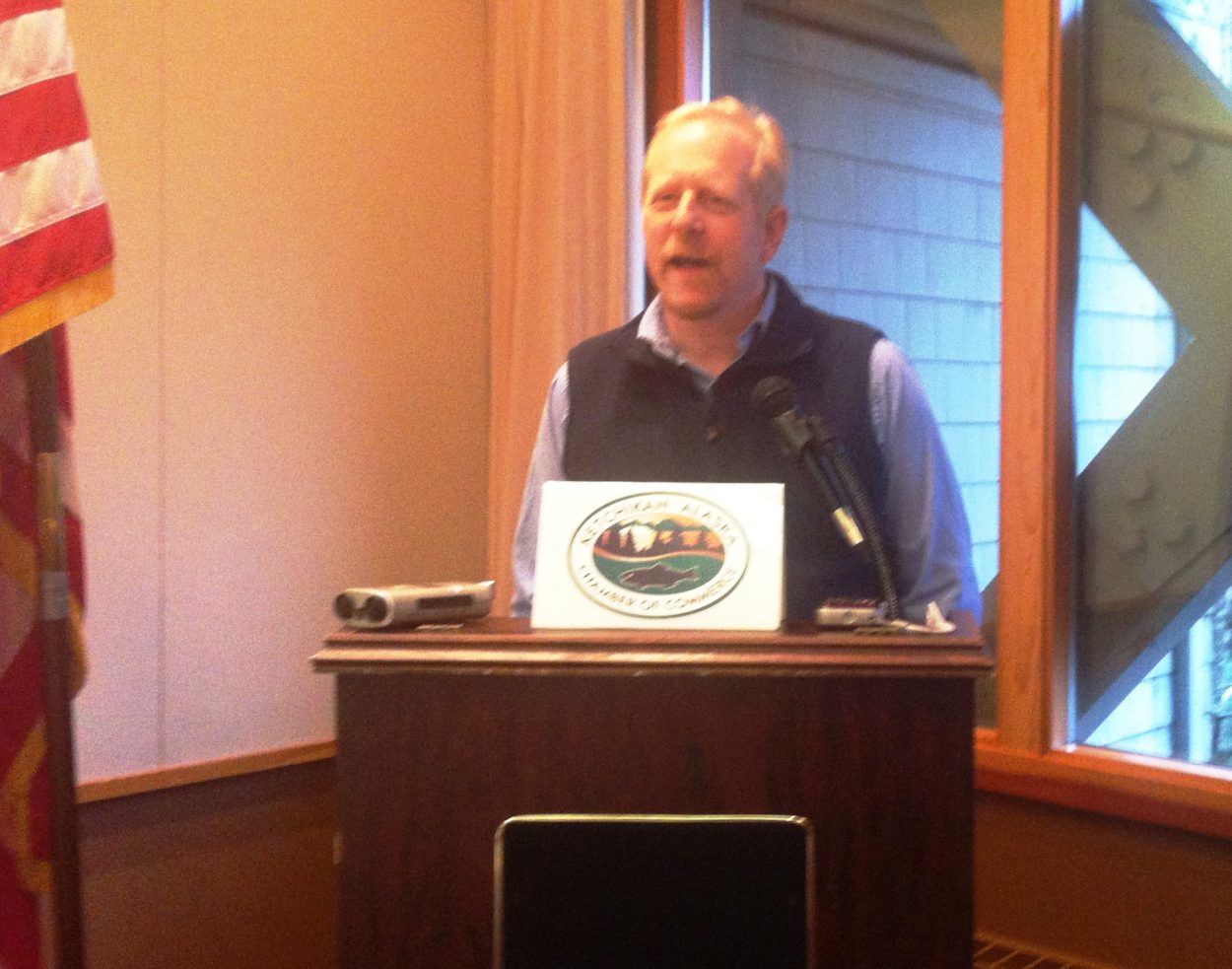As the nation’s capital gets ready for the State of the Union speech on Jan. 28, Ketchikan’s borough mayor warmed up local residents with a State of the Borough address this week to a packed audience at the regular Chamber of Commerce lunch.
“Since the city mayor said (in December) that the state of the city was good. I feel like I have to up that,” said Borough Mayor Dave Kiffer. “The state of the borough is pretty good. It’s actually darned pretty good. It’s peachy keen. It doesn’t mean it’s perfect, but we’re doing OK.”
Kiffer worked for many years as the executive director of Historic Ketchikan, so it wasn’t a surprise when he offered some historical perspective to his State of the Borough presentation. He recalled when Ketchikan Pulp Co. shut down, the community lost many year-round jobs, and quite a few people moved away.
“At that time, the State of Alaska predicted that we were basically, if not going to dry up and blow away in the future, lose significant population, that the borough was just going to crater,” he said. “At one point they were saying by the year 2020 that there might be 10,000 people left here, or 8,000 or 7,000.”
That didn’t happen, though. The population rebounded and now is back where it was in 2000. And that economic disaster that rocked the country in 2008? Well, it did lead to a drop in cruise passengers for a few years but those numbers also rebounded to where they were before the recession.
“These are good things,” Kiffer said. “The community clearly is not dying. We’re not going anywhere. We’ve been here for 125 years, we’re stubborn and we’re just not going anywhere.”
That said, there are some issues the community will face as it moves forward. One big one is that the population is aging, as more and more seniors choose to stay. Seniors are exempt from some taxes, and Kiffer said that means over time, more and more people will not pay into the local revenue stream. There’s no clear solution, but it’s something to think about.
Kiffer reviewed some of the borough’s responsibilities, and the biggest one is school funding – all borough property taxes and a chunk of sales taxes go toward local education. The borough also runs the state-owned airport; planning and zoning; economic development; assessment; parks and recreation; animal control and public transportation.
Kiffer said Ketchikan’s transit system is the third busiest in the state.
“This is interesting because if you go back six or seven years, we were talking about getting rid of our transit system,” he said. “It was expensive, costing lots of money, and just not working. Rather than do that, we hired some pretty good staff, put our nose to the grindstone and the borough has created a transit system we can really be proud of.”
Following Kiffer’s presentation, some audience members had questions. One asked about consolidating the borough and city governments, and whether there was a current effort underway to try and make that happen.
“Do I know of anyone right not who is working on consolidation? No. Do I still think people should? Yes,” he said. “We’ve had four elections. Was it five? OK, five elections. We’ve had five different attempts, and several other attempts that didn’t even reach that level. It’s never been successful.”
Kiffer said the trick is to convince the majority of voters that what they will get with consolidation is better than what they’ll be giving up. He doubts that either government will make a new attempt, though, so it will have to be a grassroots effort.
Linda Koons Auger then spoke up from the audience and announced she is collecting names for a list of people interested in consolidation.
Another audience discussion focused on improving access to Ketchikan’s airport. While the state Department of Transportation continues working on the long-awaited Gravina Access plan, local residents and visitors continue to use the ferry system that has been in place for many years. One audience member suggested a baggage check-in and pick-up building on the town side of the system, so passengers at least don’t have to lug bags on the ferry.
Kiffer said there was an attempt to make that happen years ago, but Alaska Airlines nixed the idea. Despite that, he said it makes sense.
“If anyone has ever flown at the airport in Prince Rupert, that’s what you do,” he said. “You go into a building, they take all your stuff, put you on a bus and they drive you to the airport and put you on the ferry. It doesn’t kill them, but of course they’re Canadian.”
Kiffer was elected as Ketchikan’s borough mayor in 2008, and re-elected in 2011. His current term ends this fall, and because of term limits, he will not be able to run again.






